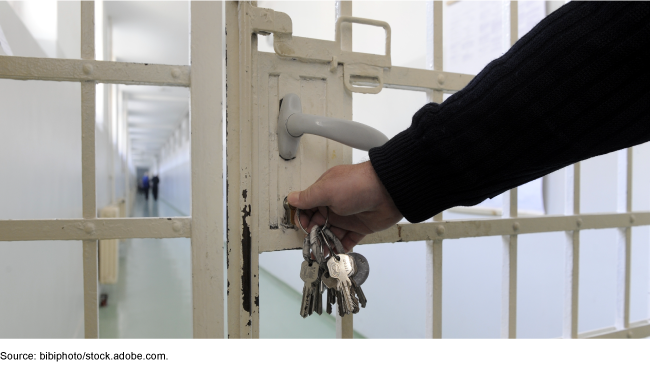Federal Prisons: Monitoring Efforts to Implement COVID-19 Recommendations and Examining First Step Act Implementation
Fast Facts
The pandemic has made it harder for the Bureau of Prisons to care for and rehabilitate the more than 157,000 federal inmates. We testified on the importance of implementing 3 recommendations from our July 2021 report to enhance the Bureau's COVID-19 response and guidance. For example, the Bureau needs a process to share and apply best practices and lessons learned with all of its facilities.
We also testified that our ongoing work is looking at how the Bureau is implementing certain provisions of the First Step Act of 2018 related to assessing an inmate's risk of reoffending and providing educational and other programs to reduce that risk.

Highlights
What GAO Found
GAO's July 2021 report on the Bureau of Prison's (BOP) response to the COVID-19 pandemic found that, while BOP developed and updated COVID-19 guidance with input from the Centers for Disease Control and Prevention (CDC), BOP staff reported confusion about how to implement the guidance. In response, GAO recommended that BOP routinely evaluate how it communicates its COVID-19 guidance to facility staff and modify its approach, as needed, to ensure more clear communication about BOP protocols. Since GAO issued the report, BOP has developed two questions on its annual feedback survey to BOP staff about its COVID-19 guidance and deployed the survey in December 2021. This is a promising step; however, the recommendation remains only partially addressed, as BOP still needs to review and assess staff feedback to determine whether modifications to its guidance are needed. GAO will continue to monitor BOP's efforts.
In addition, BOP has processes, such as teleconferences among BOP officials and facility inspections, to identify best practices and lessons learned related to BOP's COVID-19 response. However, BOP does not capture or share, bureau-wide, the lessons and practices discussed at its teleconferences, or have an approach for ensuring that facilities apply them, as appropriate. In response, GAO recommended that BOP develop and implement an approach to (1) capture and share best practices and lessons learned for responding to COVID-19 and future public health emergencies; and (2) ensure its facilities are applying, as appropriate, these best practices and lessons learned. At the time of GAO's report issuance, BOP indicated that it planned to conduct an after-action assessment of its pandemic response to help ensure preparedness for any future public health emergencies. BOP has yet to implement these two recommendations, and GAO will continue to coordinate with BOP for updates on BOP's progress.
The First Step Act (FSA) requires the Attorney General, in consultation with an Independent Review Committee, to develop and release publicly on the Department of Justice (DOJ) website a risk and needs assessment system. This system is to be used to determine the recidivism risk of each federal inmate as part of the intake process. It is also to be used to help determine and assign the type and amount of evidence-based recidivism reduction (EBRR) programming—activities designed to help inmates succeed upon release from prison—appropriate for each inmate. Generally, eligible inmates who successfully complete EBRR programming may earn time credits that will allow them to be placed in prerelease custody or supervised release earlier than they were previously allowed.
GAO is currently reviewing DOJ's and BOP's implementation of certain FSA requirements related to the risk and needs assessment and has a number of audit steps planned. These include examining BOP data and documentation on progress, and conducting interviews with DOJ and BOP officials, as well as selected stakeholders knowledgeable in the area of recidivism. GAO expects to publish the findings of its work, and any related recommendations that may stem from its findings, later in 2022.
Why GAO Did This Study
BOP is responsible not only for the supervision and custody of more than 157,000 federal inmates, but also for their health care, safety, and rehabilitation. The COVID-19 pandemic has strained BOP's institutions, yet BOP's obligation to provide inmates with programs to advance their education and development remains. Further, BOP has ongoing challenges with leadership instability and staff shortages. In response, GAO raised federal prison management as an emerging issue on its High-Risk List.
This statement discusses (1) three recommendations GAO made in July 2021 to enhance BOP's COVID-19 response and efforts to date to address them, and (2) GAO's ongoing review of DOJ's and BOP's implementation of FSA requirements related to inmate assessments and programming.
GAO updated information on BOP's activities in response to GAO recommendations, reviewed FSA requirements, and conducted preliminary research to design its audit work
Recommendations
In July 2021, GAO recommended that BOP evaluate communication of COVID-19 guidance, develop an approach to capture and share best practices and lessons learned, and ensure that facilities apply these practices as appropriate. BOP concurred with these recommendations and is planning or taking actions to implement them.
